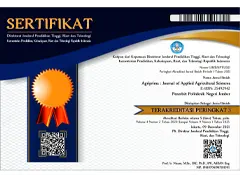Induction of Protocorm-Like Bodies (PLBs) Phalaenopsis spp. Hybrids Mutation through Ultraviolet Irradiation (UV254) and Ethyl Methane Sulfonate (EMS)
DOI:
10.25047/agriprima.v7i1.512Downloads
Abstract
Phalaenopsis sp. is the most-produced orchid species in Indonesia. Compared to conventional breeding, mutation induction by using mutagens, such as Ultraviolet Light-C (λ = 254 nm) (UV254) and Ethyl Methane Sulfonate (EMS), could probably result in new superior orchid variants. This research aims to get some mutants with phenotypes that have visual differences in the Phalaenopsis spp. hybrids wild type. There were 4 durations of UV254 irradiation: 5’ on, 85’ off; 10’ on, 80’ off (1 day and 7 days for each treatment); 4 concentrations of EMS used in this research: 0.05%; 0.06%; 0.07%; 0.08% for 6 hours of immersion; selected UV254 irradiation (5’ on, 85’ off (7 days)) combined with these concentrations. UV254 irradiation treatment (5’ on, 85’ off (1 day and 7 days); 10’ on, 80’ off (7 days)) resulted in some mutants with leaf phenotypes that were visually different from the wild type; 0.05% EMS treatment resulted in PLBs mutant with a visually larger size than the wild type; 0.08% EMS treatment and combination treatments (for EMS 0.05% and 0.08% for each treatment) resulted in non-growing albino PLBs. Hence, mutation induction using UV254 and EMS in this research produced several most likely mutants having visual differences that may be more desirable than the wild type.
Keywords:
EMS Phenotype Mutation Combination Treatmen UV254References
Afza, H., & Iriawati. (2015). Pengaruh Iradiasi Ultraviolet terhadap Multiplikasi Tunas Aksiler dan Kadar Klorofil Anyelir (Dianthus caryophyllus L.). Buletin Plasma Nutfah, 21(1), 39–46.
Amini, M. (2014). Ethyl Methanesulfonate. In Encyclopedia of Toxicology (Third, hal. 522–524). Elsevier. https://doi.org/10.1016/B978-0-12-386454-3.01124-6
Arisha, M. H., Liang, B.-K., Shah, S. N. M., Gong, Z.-H., & Li, D.-W. (2014). Kill curve analysis and response of first generation Capsicum annuum L. B12 cultivar to ethyl methane sulfonate. Genetics and Molecular Research, 13(4), 10049–10061. https://doi.org/10.4238/2014.November.28.9
Castronuovo, D., Sofo, A., Lovelli, S., Candido, V., & Scopa, A. (2017). Effects of UV-C radiation on common dandelion and purple coneflower: First results. International Journal of Plant Biology, 8(7255), 61–64. https://doi.org/10.4081/pb.2017.7255
Chen, X., & Thibeault, S. (2013). Effect of DMSO concentration, cell density and needle gauge on the viability of cryopreserved cells in three dimensional hyaluronan hydrogel. Proceedings of the Annual International Conference of the IEEE Engineering in Medicine and Biology Society, EMBS, 6228–6231. https://doi.org/10.1109/EMBC.2013.6610976
Chookoh, N., Chiu, Y. T., Chang, C., Hu, W. H., & Dai, T. E. (2019). Micropropagation of tolumnia orchids through induction of protocorm-like bodies from leaf segments. HortScience, 54(7), 1230–1236. https://doi.org/10.21273/HORTSCI13747-18
Damayanti, F. (2021). Potensi Pemuliaan Mutasi Radiasi sebagai upaya Peningkatan Variasi Genetik pada Tanaman Hias. EduBiologia, 1(2), 78–84.
Ewen, M., Bresson, J.-L., Dalmay, T., Dewhurst, I. C., Epstein, M. M., Firbank, L. G., Guerche, P., Hejatko, J., Moreno, F. J., Naegeli, H., Nogue, F., Serrano, J. J. S., Giovanni Savoini, Veromann, E., Veronesi, F., Casacuberta, J., Lenzi, P., Guajardo, I. M., Raffaello, T., & Rostoks, N. (2021). In vivo and in vitro random mutagenesis techniques in plants. EFSA Journal, 19(11). https://doi.org/10.2903/j.efsa.2021.6611
Hadebe, S. T., Modi, A. T., & Shimelis, H. A. (2017). Determination of optimum ethylmethanesulfonate conditions for chemical mutagenesis of selected vernonia (Centrapalus pauciflorus) accessions. South African Journal of Plant and Soil, 1–7. https://doi.org/10.1080/02571862.2017.1317851
Huang, Y. W., Tsai, Y. J., Cheng, T. C., Chen, J. J., & Chen, F. C. (2014). Physical wounding and ethylene stimulated embryogenic stem cell proliferation and plantlet regeneration in protocorm-like bodies of phalaenopsis orchids. Genetics and Molecular Research, 13(4), 9543–9557. https://doi.org/10.4238/2014.NOVEMBER.12.3
Li, C., Dong, N., Zhao, Y., Wu, S., Liu, Z., & Zhai, J. (2021). A Review for the Breeding of Orchids: Current Achievements and Prospects. Horticultural Plant Journal. https://doi.org/10.1016/J.HPJ.2021.02.006
Magdalita, P. M., San Pascual, A. O., & Villareal, R. L. (2019). Characterization and Flowering Behavior of Eleven Philippine Native Phalaenopsis Species and Gamma Irradiation Effects on Phalaenopsis aphrodite. Philippine Journal of Science, 149(S1), 1–10.
Mose, W., Indrianto, A., Purwantoro, A., & Semiarti, E. (2017). The Influence of Thidiazuron on Direct Somatic Embryo Formation from Various Types of Explant in Phalaenopsis amabilis (L.) Blume Orchid. HAYATI Journal of Biosciences, 24(4), 201–205. https://doi.org/10.1016/J.HJB.2017.11.005
Müller-Xing, R., Xing, Q., & Goodrich, J. (2014). Footprints of the sun: Memory of UV and light stress in plants. Frontiers in Plant Science, 5(SEP), 474. https://doi.org/10.3389/FPLS.2014.00474/BIBTEX
Ningrum, E. F. C., Rosyidi, I. N., Puspasari, R. R., & Semiarti, E. (2017). Perkembangan Awal Protocorm Anggrek Phalaenopsis amabilis secara In Vitro setelah Penambahan Zat Pengatur Tumbuh α-Naphtaleneacetic Acid dan Thidiazuron. Biosfera, 34(1), 9–14. https://doi.org/10.20884/1.mib.2017.34.1.393
Novak, S. D., Luna, L. J., & Gamage, R. N. (2014). Plant Signaling & Behavior Role of Auxin in Orchid Development. Plant Signaling & Behavior, 9(10), e972277. https://doi.org/10.4161/psb.32169
Qosim, W. A., Istifadah, N., Djatnika, I., & Yunitasari. (2012). Pengaruh Mutagen Etil Metan Sulfonat terhadap Kapasitas Regenerasi Tunas Hibrida Phalaenopsis In Vitro. Jurnal Hortikultura, 22(4), 360–365.
https://doi.org/10.21082/jhort.v22n4.2012.p360-365
Romeida, A., Stujahjo, S. H., Purwito, A., Sukma, D., & Rurstikawati. (2012). Induksi Mutasi Protocorm Like Bodies (PLB) Anggrek Spathoglottis plicata Blume. Aksesi Bengkulu pada Sebelas Taraf Dosis Iradiasi Sinar Gamma. Prosiding Simposium dan Seminar bersama PERAGI-PERHORTI-PERIPI-HIGI mendukung Kedaulatan Pangan dan Energi yang Berkelanjutan, 381–387.
Romiyadi, R., Komariah, A., & Amien, S. (2018). Keragaan Tiga Jenis Planlet Anggrek Phalaenopsis Asal Protocorm yang Diinduksi Ethyl Methyl Sulfonate (EMS) secara in Vitro. Kultivasi, 17(1), 596–607. https://doi.org/10.24198/kultivasi.v17i1.16077
Srivastava, D., Gayatri MC, & SK Sarangi. (2018). In Vitro Mutagenesis and Characterization of Mutants through Morphological and Genetic Analysis in Orchid Aerides crispa Lindl. Indian Journal of Experimental Biology, 56(June 2018), 385–394.
Sulistianingsih, R., Purwantoro, A., Mangoendidjojo, W., & Semiarti, E. (2012). Variasi Genetik Anggrek Alam Phalaenopsis amabilis (L.) Blume Hasil Iradiasi Sinar Gamma. Jurnal Ilmiah Aplikasi Isotop dan Radiasi, 8(1), 1–10. http://jurnal.batan.go.id/index.php/jair/article/view/488
Surya, M. I., Ismaini, L., Destri, & Normasiwi, S. (2016). An Effort of Mutation Breeding by Oryzalin and Gamma Rays on Wild Raspberry (Rubus sp.) in Cibodas Botanical Garden. Biosaintifika: Journal of Biology & Biology Education, 8(3), 331–335. https://doi.org/10.15294/biosaintifika.v8i3.6559
Talebi, A. B., Talebi, B. A., & Shahrokhifar, B. (2012). Ethyl Methane Sulphonate (EMS) Induced Mutagenesis in Malaysian Rice (cv. MR219) for Lethal Dose Determination. American Journal of Plant Sciences, 3, 1661–1665. https://doi.org/10.4236/ajps.2012.312202
Utami, N. R., Rahayuningsih, M., Suwarsi, E., Alighiri, D., & Yuwono, S. (2022). Aklimatisasi Anggrek Species Hasil Kultur Jaringan Melalui Pemberdayaan Masyarakat Dusun Gempol. Sarwahita, 19(01), 171–181. https://doi.org/10.21009/sarwahita.191.15
Widiarsih, S., & Dwimahyani, I. (2013). Aplikasi Iradiasi Gamma untuk Pemuliaan Mutasi Anggrek Bulan (Phalaenopsis amabilis Bl.) Umur Genjah . Jurnal Ilmiah Aplikasi Isotop dan Radiasi, 9(1), 59–66.
Yudayantho, I., Avivi, S., Hariyono, K., & Hartatik, S. (2022). Analisis Pendugaan Parameter Genetik pada Genotipe Tebu Mutan. Agriprima, 6(2), 124–134. https://agriprima.polije.ac.id/index.php/journal/article/view/v6i2-c/pdf
Yulianyo, T. B., Taufiq, A. J., & Suyadi, A. (2019). Rancang Bangun Pengaturan Intensitas Sinar Uv (Ultraviolet) Dengan Mikrokontroler PIC Untuk Tanaman. Jurnal Riset Rekayasa Elektro, 1(1), 54–70.
Zahara, M. (2017). A Review: Micropropagation of Phalaenopsis sp from Leaf and Flower Stalk Explants. Jurnal Natural, 17(2), 91. https://doi.org/10.24815/jn.v0i0.8130
License
Copyright (c) 2023 Agatha Sullivania Kurniadi, Fenny Irawati, Sulistyo Emantoko Dwi Putra, Poppy Hartatie Hardjo (Author)

This work is licensed under a Creative Commons Attribution-ShareAlike 4.0 International License.
You are free to:
- Share — copy and redistribute the material in any medium or format.
- Adapt — remix, transform, and build upon the material for any purpose, even commercially.
Under the following terms:
- Attribution — You must give appropriate credit, provide a link to the license, and indicate if changes were made. You may do so in any reasonable manner, but not in any way that suggests the licensor endorses you or your use.
- ShareAlike — If you remix, transform, or build upon the material, you must distribute your contributions under the same license as the original.
- No additional restrictions — You may not apply legal terms or technological measures that legally restrict others from doing anything the license permits.









